Are you ready to take a walk on the wild side and learn about a dog breed that combines the best of two worlds? Well, hold on to your leashes because the German Sheprador is here to steal your heart.
This unique mixed breed, a delightful fusion of a German Shepherd and a Labrador Retriever, brings together the loyalty, intelligence, and protective nature of the German Shepherd with the friendly, playful, and outgoing personality of the Labrador Retriever.
But that's not all; there's so much more to uncover about the German Sheprador's characteristics and traits that will leave you wanting to know more. So, let's unleash the knowledge and discover what makes this breed so special.
Key Takeaways
- German Shepradors are a mixed breed dog, not a purebred, known for their unique appearance and color variations.
- They can adapt well to apartment living, but size alone should not be the sole determinant for suitability. Energy levels and behavior should also be considered.
- German Shepradors make excellent family companions and watchdogs, providing unconditional love and emotional support.
- When it comes to choosing a dog for a family, personal interaction is key to understanding their affection and suitability. Not all dogs of the same breed will be equally affectionate or compatible with children.
Breed Overview
The German Sheprador is a mixed breed dog that combines the characteristics of the German Shepherd and the Labrador Retriever. This breed is known for its intelligence, loyalty, and playful nature.
German Shepradors have a medium to large size, with a muscular build and a sturdy frame. They have a thick and dense coat that is usually short to medium in length. The coat can come in a variety of colors, including black, white, red, cream, blue, and grey.
German Shepradors are highly adaptable and can thrive in various environments, including apartments, as long as they receive enough exercise and mental stimulation. They make excellent family companions and are known for their protective instincts.
With proper care and training, the German Sheprador can be a loving and loyal addition to any family.
Appearance and Colors
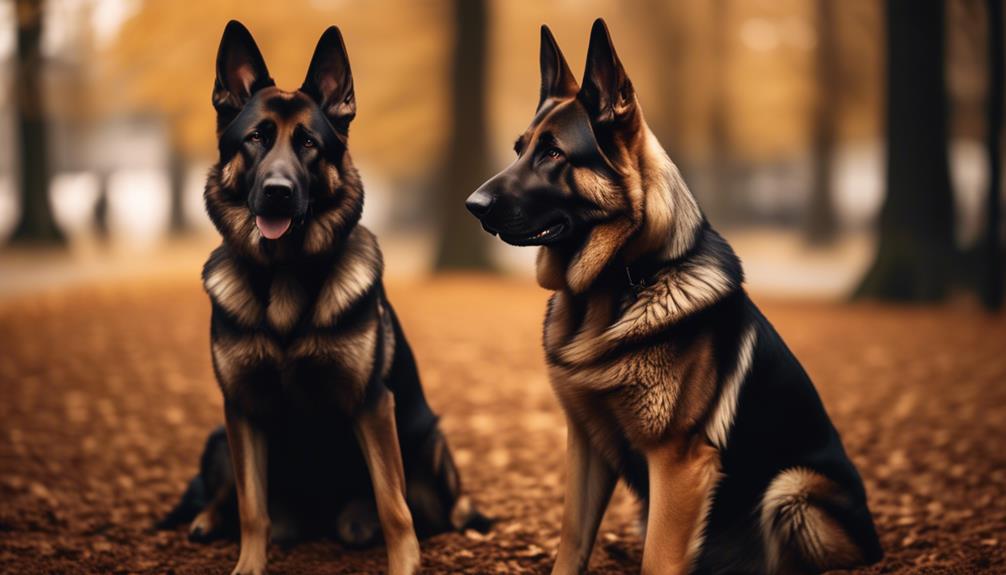
When it comes to the appearance and colors of the German Sheprador, you can expect a mix of traits from its German Shepherd and Labrador Retriever parents. The German Sheprador can have a coat that comes in various colors, including black, white, red, cream, blue, and grey.
The coat itself is generally easy to care for with weekly brushing. As for the physical appearance, the German Sheprador usually has a sturdy and muscular build, inheriting the strong physique from both of its parent breeds. It tends to have a well-proportioned body, with a strong neck, deep chest, and a broad head.
The ears are typically medium-sized and may be floppy or erect. Overall, the German Sheprador is a beautiful and athletic dog with a mix of features from its German Shepherd and Labrador Retriever heritage.
Coat Care and Grooming
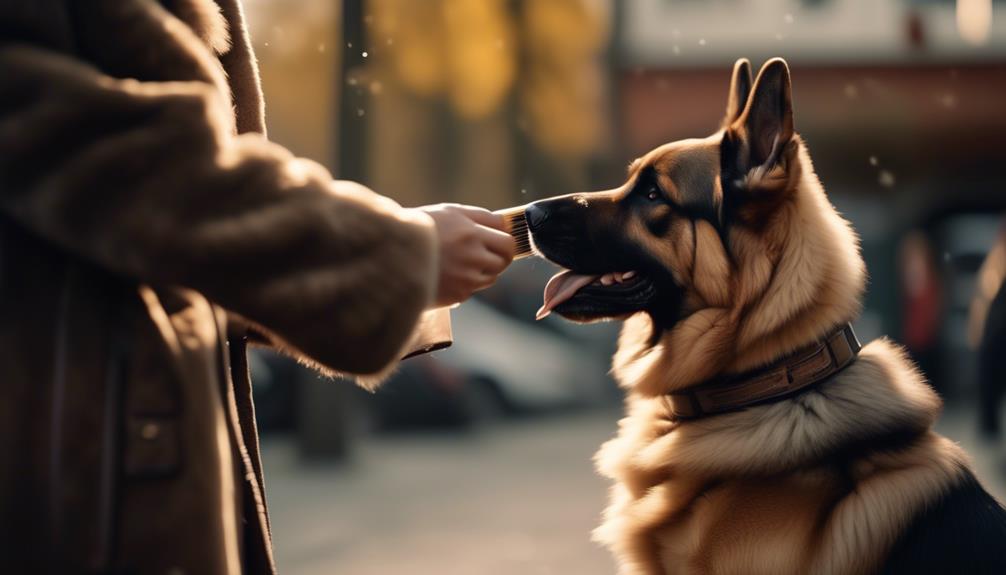
Regular coat care and grooming are essential for keeping your German Sheprador looking its best and maintaining its overall health and well-being. Here are three important things to know about coat care and grooming for your German Sheprador:
- Brushing: The German Sheprador's coat is generally easy to care for and only requires weekly brushing. This helps to remove loose hair, prevent matting, and keep the coat looking clean and shiny. Use a slicker brush or a medium-toothed comb to gently brush through the coat, paying attention to areas that are prone to tangles, such as behind the ears and under the legs.
- Bathing: Your German Sheprador only needs to be bathed as needed, typically every few months or when they become dirty. Use a gentle dog shampoo and make sure to thoroughly rinse out all the soap to avoid skin irritation. After bathing, towel dry your dog and brush their coat to prevent tangles and promote faster drying.
- Nail trimming and ear cleaning: Regularly trim your German Sheprador's nails to keep them at a comfortable length. Be cautious not to cut too close to the quick, as it can cause bleeding. Additionally, check your dog's ears regularly for debris and pests, and clean them as recommended by your veterinarian to prevent infections.
Exercise and Activity Needs
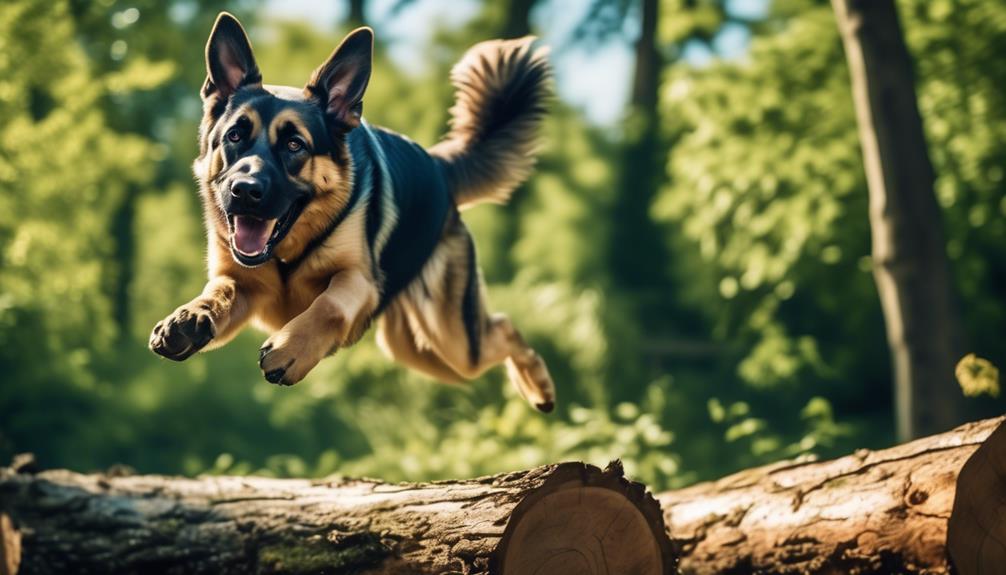
Now let's discuss the exercise and activity needs of your German Sheprador, ensuring that they receive the physical stimulation necessary to maintain their overall health and well-being.
German Shepradors are a high-energy breed, inheriting their energy from both the German Shepherd and Labrador Retriever parents. They require regular exercise to keep them mentally and physically stimulated. Aim for at least one hour of exercise per day, which can include walks, runs, playtime in a fenced yard, or engaging in interactive games like fetch or agility training.
These activities will help prevent boredom and destructive behaviors that may arise from pent-up energy. It's important to note that German Shepradors thrive in an active household and may not be suitable for individuals or families with a sedentary lifestyle.
Regular exercise will contribute to their overall well-being and help maintain a healthy weight.
Temperament and Personality Traits
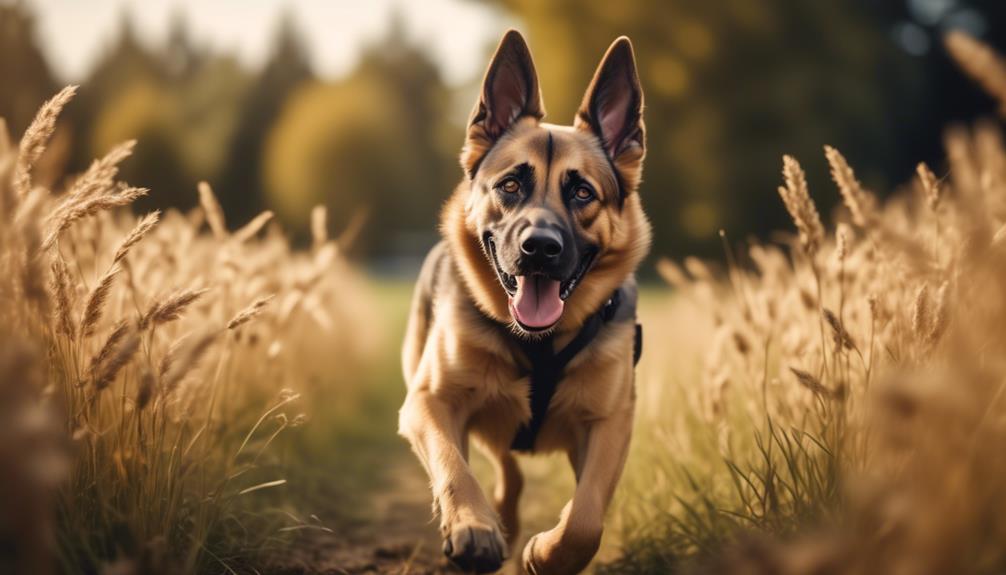
The temperament and personality traits of the German Sheprador make them a delightful and versatile companion for families and individuals alike. Here are three key traits that define the German Sheprador's temperament:
- Intelligent: German Shepradors are highly intelligent dogs, inheriting the intelligence of both their German Shepherd and Labrador Retriever parents. This makes them quick learners and eager to please, making training sessions enjoyable and effective.
- Loyal: Known for their loyalty, German Shepradors form strong bonds with their owners and families. They're devoted and protective, making them excellent watchdogs. Their loyalty extends to being great with children, making them a wonderful addition to family households.
- Energetic: German Shepradors have high energy levels and require regular exercise to keep them happy and healthy. They enjoy physical activities such as running, playing fetch, and participating in outdoor adventures. Their energy and enthusiasm make them ideal companions for active individuals or families who enjoy an active lifestyle.
Adaptability to Apartment Living
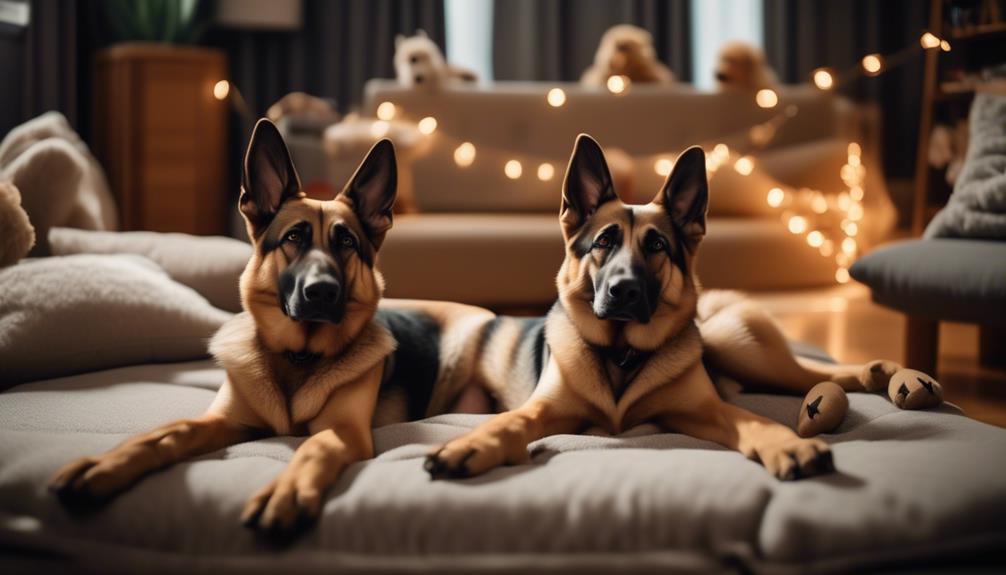
If you're considering living in an apartment and are wondering if a German Sheprador would be adaptable to this type of environment, you'll be pleased to know that these mixed breed dogs can thrive in apartment living. Despite their size, German Shepradors are known for their adaptability and can adjust well to living in smaller spaces. They aren't solely reliant on having a large backyard to meet their exercise needs.
With regular walks and mental stimulation, they can be content in an apartment setting. However, it's important to note that they're an active breed and will still require daily exercise to prevent boredom and restlessness. Providing them with opportunities for physical and mental stimulation, such as puzzle toys and interactive games, will help keep them happy and fulfilled in an apartment environment.
Choosing the Right Dog for Your Home
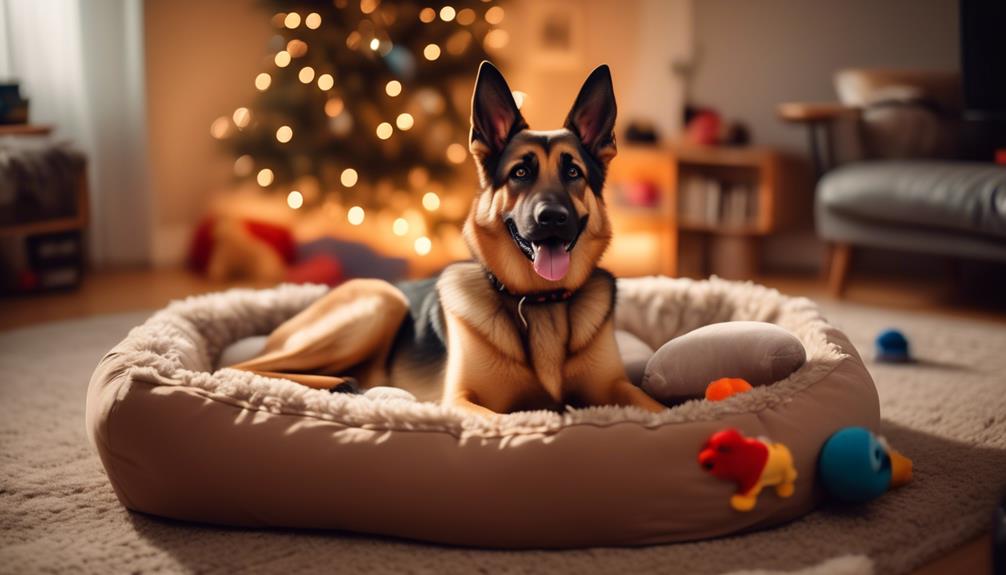
When choosing the right dog for your home, it's important to consider factors such as size, energy levels, and compatibility with your living environment. Here are three key things to keep in mind:
- Size: Consider the space you have available in your home. If you live in a small apartment, a smaller breed may be more suitable. However, if you have a large yard or live in a spacious house, you may have more flexibility with the size of the dog.
- Energy Levels: Think about your own activity level and lifestyle. Some dogs require a lot of exercise and mental stimulation, while others are more laid-back. Make sure the dog's energy levels align with your own to ensure a good match.
- Compatibility with Living Environment: Take into account any specific requirements or restrictions of your living environment. For example, if you live in an apartment building with noise restrictions, you may want to avoid breeds that are prone to excessive barking.
Family-Friendliness and Compatibility
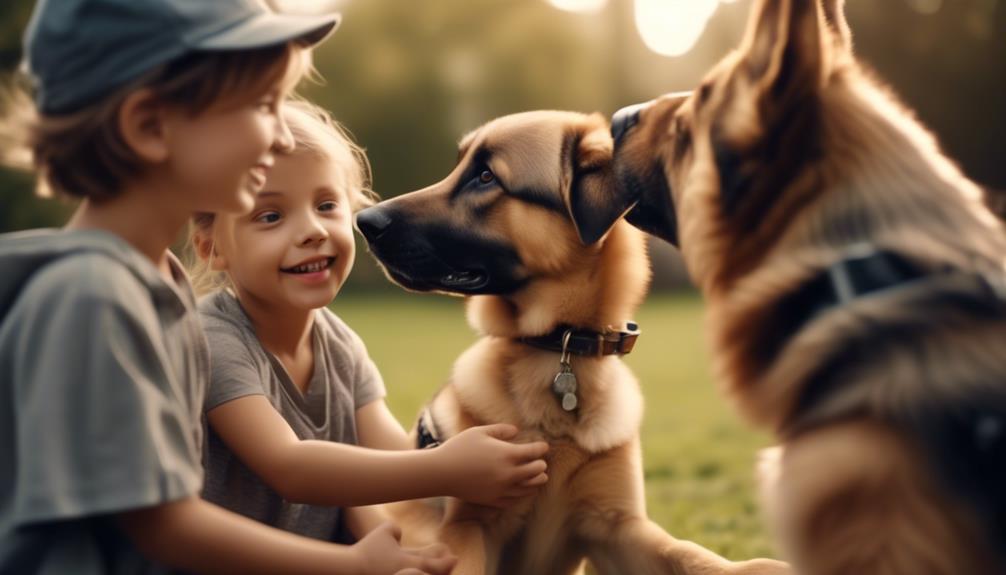
Choosing a family-friendly and compatible dog involves considering their temperament, socialization needs, and compatibility with children and other pets. The German Sheprador is known for being an excellent family companion. They're affectionate, loyal, and have a strong bond with their owners. They're gentle and sturdy with children, making them a good choice for families with kids.
However, it's important to note that individual dogs may have different temperaments, even within the same breed. It's recommended to meet and interact with a dog before making a decision. Proper socialization and training are also key factors in ensuring a dog's compatibility with children and other pets.
Interacting With Children
The German Sheprador is a dog breed that interacts well with children, making them a wonderful addition to families. Here are three reasons why the German Sheprador is kid-friendly:
- Gentle and Sturdy: The German Sheprador is known for its gentle and sturdy nature when interacting with children. They can handle heavy-handed pets and hugs without getting agitated or aggressive.
- Patience with Children: This breed has a blasé attitude towards running and screaming children, which is a positive trait. They remain calm and patient, ensuring a safe and enjoyable environment for kids to play and interact with them.
- Compatibility and Safety: Certain breeds, like Boxers and American Staffordshire, are considered good with children, and the German Sheprador falls into this category. Their compatibility and safety with kids have been proven through positive experiences and interactions.
With their gentle demeanor and patient attitude, German Shepradors are excellent companions for children, creating lasting bonds and cherished memories.
Health and Common Health Issues
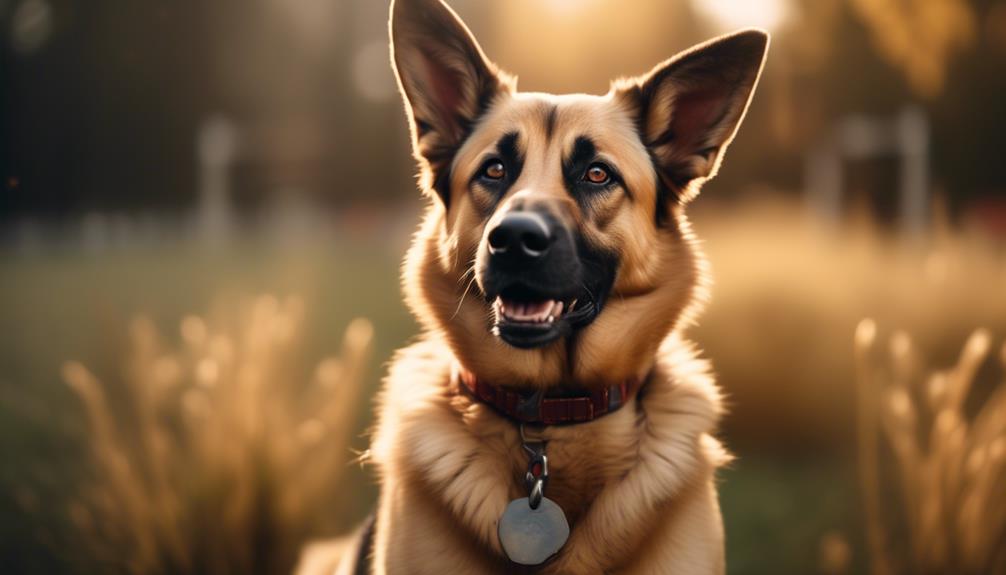
Now let's shift our focus to the important topic of the health and common health issues that German Shepradors may face. German Shepradors are generally healthy dogs, but they may be prone to certain health conditions that are common in German Shepherds and Labradors. Some of the common health issues that German Shepradors may experience include hip and elbow dysplasia, as well as digestive issues. It is important to provide regular veterinary checkups and good care to ensure the overall health and well-being of your German Sheprador. By being proactive in their healthcare, you can help detect any potential health concerns early on and provide the necessary treatment or management.
| Health Issue | Description | Prevention/Treatment |
|---|---|---|
| Hip Dysplasia | Abnormal development of the hip joint | Regular exercise, maintaining a healthy weight |
| Elbow Dysplasia | Abnormal development of the elbow joint | Regular exercise, maintaining a healthy weight |
| Digestive Issues | Gastrointestinal problems such as diarrhea or bloating | Balanced diet, regular veterinary checkups |
Veterinary Care and Regular Checkups
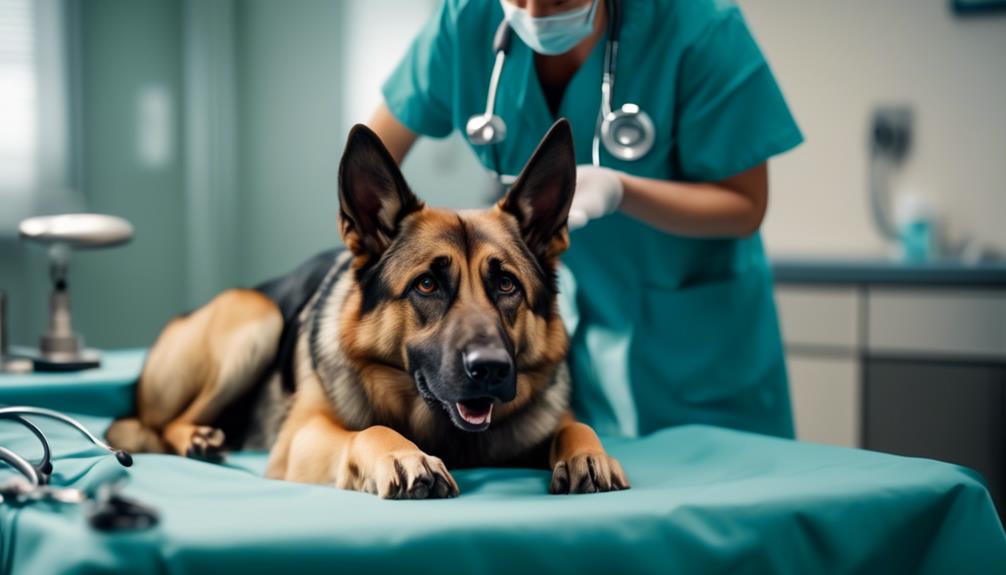
When it comes to ensuring the overall health and well-being of your German Sheprador, veterinary care and regular checkups are essential. Regular visits to the vet can help catch any potential health issues early on and ensure that your dog receives the necessary vaccinations and preventative treatments.
Here are three reasons why veterinary care and regular checkups are important for your German Sheprador:
- Early detection of health issues: Regular checkups allow the vet to examine your dog thoroughly and detect any signs of illness or underlying health conditions. This early detection can lead to prompt treatment and better chances of recovery.
- Vaccinations and preventative treatments: Veterinary care includes vaccinations to protect your German Sheprador against common diseases such as rabies, distemper, and parvovirus. Additionally, regular checkups allow the vet to provide preventative treatments for parasites like fleas, ticks, and heartworm.
- Overall well-being and monitoring: Regular checkups allow the vet to monitor your dog's weight, dental health, and overall well-being. They can provide guidance on nutrition, exercise, and any necessary lifestyle adjustments to keep your German Sheprador healthy and happy.
Feeding and Dietary Recommendations
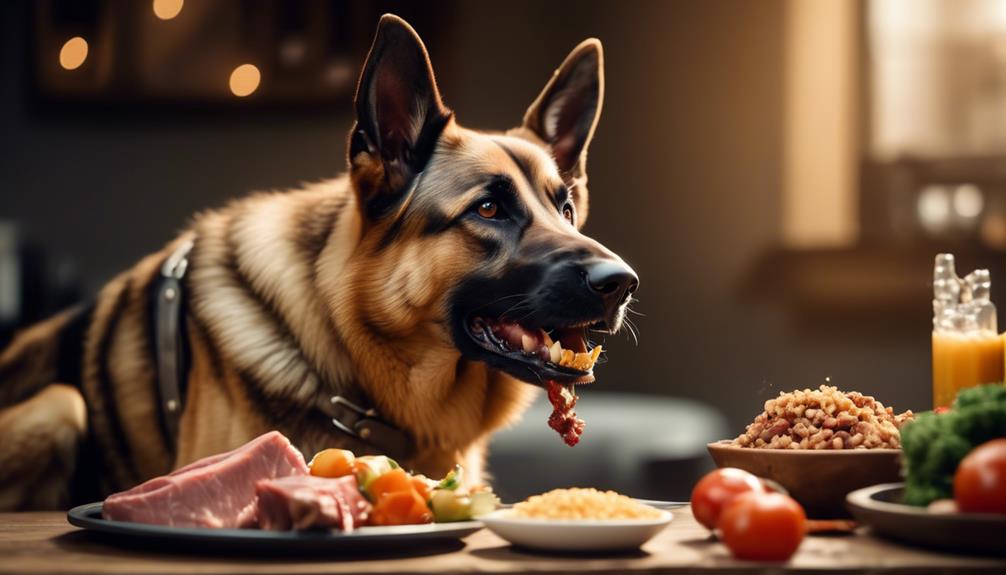
After discussing the importance of veterinary care and regular checkups for your German Sheprador, it's crucial to understand the feeding and dietary recommendations that will help keep your dog healthy and thriving. Feeding your German Sheprador a balanced diet is essential for their overall well-being. As a large breed with high energy, their diet should be formulated accordingly. It's important to avoid overfeeding, as this can lead to weight gain and potential health issues. Consult with your veterinarian to determine the appropriate feeding schedule and portion sizes for your dog's age and activity level. Additionally, it's recommended to limit treats and avoid leaving food out during the day. By providing your German Sheprador with a nutritious diet, you can help ensure their optimal health and longevity.
| Feeding and Dietary Recommendations |
|---|
| – Feed a balanced diet |
| – Formulate diet for a large breed with high energy |
| – Avoid overfeeding, limit treats |
| – Consult veterinarian for feeding schedule and portion sizes |
| – Avoid leaving food out during the day |
Coat Colors and Maintenance
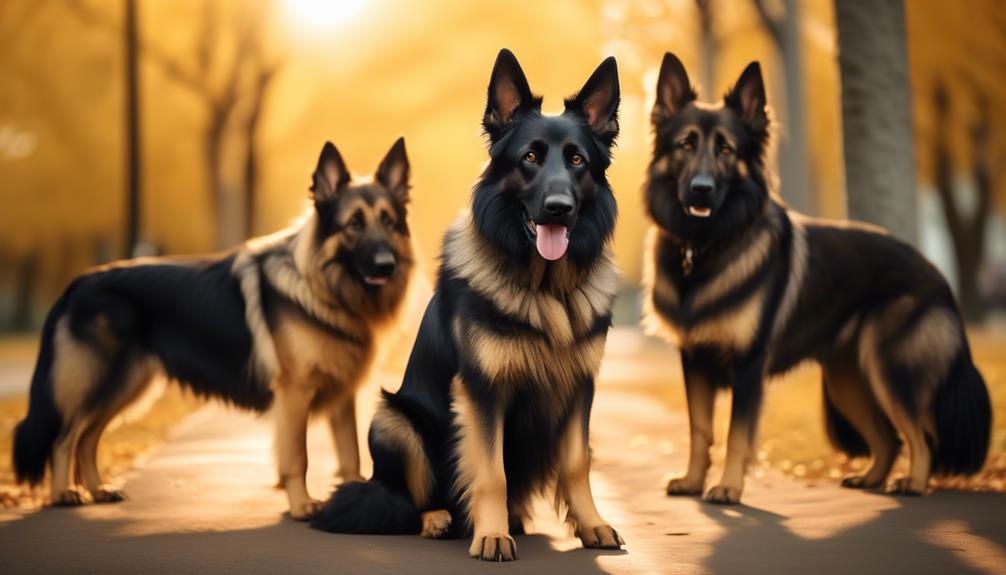
The German Sheprador comes in a variety of coat colors and requires regular maintenance to keep their coat healthy and beautiful. Here are some important points to know about coat colors and maintenance for German Shepradors:
- Coat Colors:
- German Shepradors can have a mix of coat colors inherited from their German Shepherd and Labrador Retriever parents.
- Common coat colors include black, white, red, cream, blue, and grey.
- The specific coat color of a German Sheprador can vary and may even include unique patterns or markings.
- Coat Maintenance:
- The German Sheprador's coat is generally easy to care for with weekly brushing.
- Regular brushing helps to remove loose hair, prevent matting, and keep the coat clean and shiny.
- It's important to check for any signs of skin issues, such as dryness or irritation, and consult a veterinarian if necessary.
Frequently Asked Questions
Are German Shepradors Hypoallergenic?
No, German Shepradors are not hypoallergenic. They have a mixed coat from their German Shepherd and Labrador Retriever parents, which can shed and produce allergens. If you have allergies, it's best to consider a hypoallergenic breed.
How Much Do German Shepradors Typically Weigh?
How much do German Shepradors typically weigh? German Shepradors typically weigh between 50 and 90 pounds. Their weight can vary depending on factors such as genetics, diet, and exercise level.
Are German Shepradors Good With Other Pets?
Yes, German Shepradors can be good with other pets. They are known to be social and friendly, but proper introductions and socialization are important. Monitor their interactions and provide a safe and supervised environment for all pets.
Do German Shepradors Have a Strong Prey Drive?
Yes, German Shepradors can have a strong prey drive. It is a natural instinct for them to chase and hunt small animals. Proper training and socialization can help manage this behavior.
What Is the Average Lifespan of a German Sheprador?
The average lifespan of a German Sheprador is around 10 to 14 years. This mixed breed dog can live a long and healthy life with proper care, regular exercise, and regular veterinary check-ups.
What are the similarities and differences between German Shepradors and Dutch Shepherds?
The Dutch Shepherd breed characteristics distinguish it from the German Sheprador. Both breeds are intelligent and loyal, but the German Sheprador tends to be larger and more protective. The Dutch Shepherd is known for its agility and versatility, making it popular for working roles.
Conclusion
In conclusion, the German Sheprador is a wonderful mixed breed dog that combines the best traits of the German Shepherd and Labrador Retriever. With their stunning appearance and friendly temperament, they make excellent companions for families and individuals alike.
Interestingly, did you know that German Shepradors have a lifespan of around 10-14 years on average? This statistic highlights their overall good health and longevity, making them a great choice for a furry friend that will be with you for many years to come.




